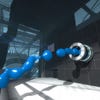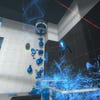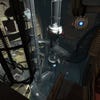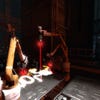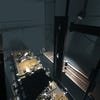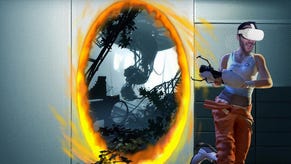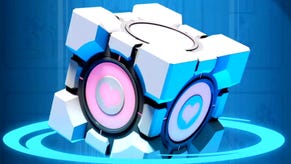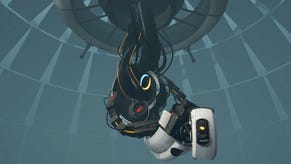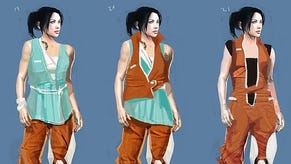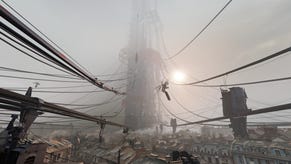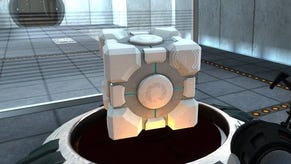Portal 2
The sound of science.
Their greatest achievements are the two robots players control in co-op: this mute comic duo is like a mechanical Laurel and Hardy brought to life by Pixar. But even the robotics of Aperture Science's test chambers are lent personality and character, moving between slick, synchronised spectacle and the involuntary, violent tics of a madman.
Valve's virtual architects have long had an extraordinary gift for pacing and environment design, and it's in full effect in Portal 2. Artful details guide you through the space and the story, or hint at untold tales. The functional puzzle chambers are still the meat of the game, of course, but they're broken up with spells of up-tempo action or quiet exploration that give the puzzles room to breathe.
And those puzzles? There's nothing Valve can do to develop or perfect the first game's exploration of portals, whereby you use the two mouse buttons or triggers to 'fire' two doors onto certain surfaces, allowing you to teleport yourself and objects, or subvert the laws of physics and three-dimensional space to reach your goal.
So a number of new devices are introduced, the designers toying succinctly with each before moving on to the next. Sprung platforms called Aerial Faith Plates, and the Propulsion and Repulsion Gels that increase your running speed and jump height, are fairly standard-issue platform game mechanics given a great new lease of life by portals. Splattering gel like paint through cunningly-placed portals, or using portals to turn the faith plates into trampolines or orbital slingshots is a thrill that's both cerebral and visceral.
But the game's very best posers involve beams: laser switches, the Hard Light Bridge (a beamed platform) and the Excursion Funnel (a tractor beam that can pull or push you through the air). There's also a memorable moment of genius involving Conversion Gel, which allows you to apply portals to previously inert surfaces.
It's not until the very end of the game that Valve's designers dare to bring all these elements together – with gun turrets, cubes and switches, of course – in a mind-bending crescendo of ingenuity. Some chambers are vast, layered, cause-and-effect constructions that seem impossible before revealing a solution of such imagination, tactile satisfaction and devilish wit that you'll laugh as long and loud as you do at any of the jokes.
It's a shame it has to end, but it does, and unlike most games it ends very well, with a dumbfounding punchline and delightfully absurd coda. (Trying to recreate Still Alive in a new end-credits song was a mistake, though.) But Portal 2 is not over, because you can go on to enjoy several very happy hours of co-operative puzzling with a friend.
Co-op presents the most natural and intellectually terrifying extension of Portal's puzzle-platforming lexicon: two more portals. But if you're worried that these will simply be too much for your brain to handle, don't be. This mode is the perfect proof of the old maxim that two heads are better than one.
Valve realised in testing that it could set the difficulty bar much higher for co-op simply because talking through a problem will lead you more quickly to its solution. The result is one of the most satisfying and genuinely collaborative gaming experiences you can have with a friend.
(Digital Foundry will present a full multi-format Portal 2 comparison soon, but for now let's note that only the consoles offer split-screen co-op, while PC and Mac are arguably the best showcase for Valve's crisp visuals and precise controls. PS3 has the tempting bonus of cross-platform play via Steam and free access to the computer versions – but they all look great and play better.)
It's impossible to completely allay Portal fans' fears that this sequel might sully its pristine beauty. Although it's certainly no pushover, it's definitely more eager to please, and sometimes it's guilty of playing to the gallery. If you hate the idea that Stephen Merchant, comedy robots and tart fat jokes can exist in the same universe as Half-Life's Combine and Black Mesa, Portal 2 might offend you.
There's simply too much game here for it never to falter – but it hardly ever does. It's so generous and complete, so satisfying in each moment and in the whole, that a momentary lull, an overused mechanic or a cheap gag seem like trivial flaws.
Portal is perfect. Portal 2 is not. It's something better than that. It's human: hot-blooded, silly, poignant, irreverent, base, ingenious and loving. It's never less than a pure video game, but it's often more, and it will no doubt stand as one of the best entertainments in any medium at the end of this year. It's a masterpiece.

